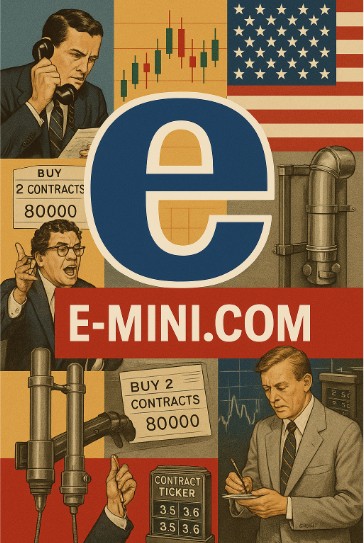Options on futures brokers play a critical role in the trading ecosystem, serving as intermediaries who facilitate trades, provide market insights, and offer strategic advice to clients. Their expertise lies not only in the mechanics of trading but also in a deep understanding of options pricing models, the Greeks, and various trading strategies. To be an excellent option on futures broker, one must possess a comprehensive skill set and extensive knowledge, allowing them to effectively manage risk and maximize opportunities for their clients.
Important Skills and Knowledge for an Options on Futures Broker
Understanding Options Pricing Models
A fundamental skill for any options on futures broker is a thorough understanding of options pricing models. The most widely used model is the Black-Scholes model, which helps in calculating the theoretical price of options. This model considers factors such as the current price of the underlying asset, the strike price of the option, time to expiration, risk-free interest rate, and the volatility of the underlying asset.
Mastery of the Greeks
The Greeks are crucial risk measures that provide insights into how various factors influence the price of options. They include Delta, Gamma, Theta, and Vega, each representing a different aspect of risk:
- Delta: Measures the sensitivity of an option’s price to changes in the price of the underlying asset. A knowledgeable broker understands that Delta ranges from 0 to 1 for call options and from 0 to -1 for put options. It indicates the approximate change in the option’s price for a $1 move in the underlying asset. For example, a Delta of 0.5 means the option’s price will move $0.50 for every $1 move in the underlying asset.
- Gamma: Represents the rate of change of Delta with respect to the price of the underlying asset. Gamma is important for understanding the stability of Delta and managing Delta-hedged positions. A high Gamma indicates significant changes in Delta, which can impact the strategy’s effectiveness.
- Theta: Measures the rate of decline in the value of an option due to the passage of time, often referred to as time decay. Brokers must understand that options lose value as they approach expiration, and this decay accelerates as the expiration date nears. Theta is crucial for strategies involving the selling of options, as the broker can capitalize on this time decay.
- Vega: Indicates the sensitivity of an option’s price to changes in the volatility of the underlying asset. An increase in volatility generally increases the price of options, making Vega a critical factor during periods of market uncertainty or high volatility.
The Role of an Options on Futures Broker
Providing Strategic Advice
A proficient broker not only facilitates trades but also offers strategic advice tailored to the client’s goals and risk tolerance. This involves recommending appropriate options strategies, such as covered calls, protective puts, and various spread strategies.
- Covered Calls: This strategy involves holding a long position in an underlying asset and selling call options on that same asset. It generates income through the premiums received from selling the calls while providing some downside protection. Brokers must advise on the best strike prices and expiration dates to optimize returns.
- Protective Puts: This involves buying put options to hedge against potential declines in the value of an underlying asset. The broker must determine the appropriate put options to purchase, balancing the cost of the options against the level of protection required.
- Spreads and Combinations: These strategies involve simultaneously buying and selling options with different strike prices or expiration dates. Examples include bull spreads, bear spreads, and iron condors. Brokers need to understand the risk-reward profiles of these strategies and how they align with the client’s objectives.
Managing Risk
Effective risk management is crucial for options on futures brokers. They must ensure that clients’ portfolios are well-hedged against market volatility and adverse price movements. This involves continuous monitoring of positions and adjusting strategies as market conditions change. Techniques include:
- Delta Hedging: Adjusting the portfolio to be Delta-neutral, meaning the overall Delta is close to zero. This minimizes the impact of small price movements in the underlying asset on the portfolio’s value.
- Volatility Management: Advising clients on how to capitalize on changes in volatility, either through the purchase of options when volatility is low or the sale of options when volatility is high.
- Time Decay Exploitation: Utilizing strategies that benefit from time decay, such as selling options with short time to expiration. Brokers need to balance the income generated from premiums against the risk of the options being exercised.
The Difference Between Knowledgeable and Unknowledgeable Futures Brokers
The distinction between knowledgeable and unknowledgeable futures brokers can significantly impact a client’s trading outcomes. Knowledgeable brokers possess:
- In-depth Market Understanding: They stay informed about market trends, economic indicators, and geopolitical events that influence futures prices and volatility.
- Advanced Analytical Skills: Proficiency in using technical analysis, fundamental analysis, and quantitative models to make informed trading decisions.
- Strategic Insight: The ability to devise and recommend strategies that align with the client’s risk appetite and investment goals.
- Effective Communication: Explaining complex concepts and strategies in a way that clients can understand, ensuring they are comfortable with their trading decisions.
- Ethical Standards: Maintaining transparency, integrity, and prioritizing the client’s best interests in all transactions.
Unknowledgeable brokers, on the other hand, may lack these qualities, leading to:
- Poor risk management, resulting in significant losses for clients.
- Misguided strategy recommendations that do not align with market conditions or client goals.
- Inadequate understanding of options pricing and the Greeks, leading to suboptimal trading decisions.
- Communication gaps, leaving clients confused and potentially making uninformed choices.
Options as Zero-Sum Games
It’s essential for brokers to understand that options trading is a zero-sum game. For every gain in an options position, there is an equivalent loss on the other side of the trade. This principle underscores the importance of strategic acumen and risk management.
Time Decay and Volatility in Options Pricing
Time decay and volatility are critical factors in options pricing. Brokers must grasp how these elements affect the value of options and develop strategies accordingly.
- Time Decay (Theta): As previously mentioned, options lose value over time. Brokers must factor in this erosion of value, especially when advising on long-term vs. short-term options. Selling options closer to expiration can be advantageous due to the accelerated time decay.
- Volatility (Vega): Volatility significantly impacts option prices. Higher volatility increases the potential for large price swings, raising the premiums of options. Brokers need to gauge market volatility and suggest strategies that exploit these changes, such as straddles or strangles during periods of expected high volatility.
Becoming an excellent option on futures broker requires a blend of technical knowledge, strategic insight, and effective communication skills. Mastery of options pricing models and the Greeks, coupled with a deep understanding of various trading strategies and risk management techniques, is essential. Knowledgeable brokers can navigate the complexities of the options market, offering invaluable guidance to clients and helping them achieve their financial goals. By contrast, unknowledgeable brokers can pose significant risks, underscoring the importance of expertise in this challenging yet rewarding field.
Ready to start trading futures? Call US 1(800)454-9572 – Int’l (310)859-9572 email info@e-mini.com and speak to one of our experienced, Series-3 licensed futures brokers and start your futures trading journey with E-Mini.com today.
Disclaimer – Trading Futures, Options on Futures, and retail off-exchange foreign currency transactions involves substantial risk of loss and is not suitable for all investors. Past performance is not indicative of future results. You should carefully consider whether trading is suitable for you in light of your circumstances, knowledge, and financial resources. You may lose all or more of your initial investment. Opinions, market data, and recommendations are subject to change at any time.
Important: Trading commodity futures and options involves a substantial risk of loss. The recommendations contained in this writing are of opinion only and do not guarantee any profits. This writing is for educational purposes. Past performances are not necessarily indicative of future results.
**This article has been generated with the help of AI Technology. It has been modified from the original draft for accuracy and compliance.
***@cannontrading on all socials.




